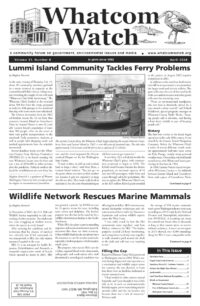by Dan Raas
Editor’s Note: Whatcom Watch has entered a cooperative agreement with Salish Current. When possible, we will share each other’s content. Salish Current, an online-only news organization, covers the North Sound area.
The 50th anniversary of the landmark Boldt Decision brought over 250 people together February 6-7 at the Muckleshoot Events Center. Old friends, former adversaries, a vision for the future and a sanctification of the late tribal leader and Nisqually tribal member Billy Frank Jr. centered the two-day gathering.
On Feb. 12, 1974, U.S. District Judge George Boldt filed his 200-plus-page decision in a case brought by the United States and 13 tribes against the state of Washington over the treaty “right of taking fish at all usual and accustomed grounds and stations” which the tribes had reserved for themselves in treaties negotiated during 1854–1856. Judge Boldt’s grandson, who had inherited his grandfather’s six-volume biography of Abraham Lincoln, noted that it was no accident that the decision was published on Lincoln’s birthday.
Major Rulings:
1. the treaties are the supreme law of the land
2. the fishing clause is enforceable against the state of Washington
3. the traditional fishing areas of the tribes collectively include the entire Salish Sea, the Strait of Juan de Fuca, the Pacific Ocean as far west as the U.S. territorial sea and all of the streams draining into the salt water
4. the tribes collectively are entitled to approximately 50 percent of the harvestable fish within these waters, and
5. when tribes achieve sufficient technical and enforcement capabilities, then each can manage its own fisheries separate from the state.
These holdings revolutionized Washington salmon management and fisheries. The federal 9th Circuit Court of Appeals compared the resulting official and private civil disobedience to the civil rights unrest in the South. In 1979, the U.S. Supreme Court affirmed Judge Boldt.
Later Major Decisions Held That:
1. the harvest is determined on a stream-by-stream and salmon-species-by-salmon-species basis rather than aggregate harvest across streams and the six salmon species
2. the term “fish” includes shellfish, halibut and herring as well as salmon
3. fish raised in a hatchery are included in the treaty right, and
4. the treaty right includes a habitat that will produce harvestable fish and that therefore the state needs to repair and maintain the culverts passing under state highways to allow for fish passage. (Last year’s project replacing culverts under the Mount Baker Highway was part of this effort.)
Cooperation Preferable
In the 1980s, the state, the tribes and the Northwest Indian Fisheries Commission (NWIFC) led by Frank realized that cooperation in fisheries management and harvest was preferable to constant confrontation in court. Frank and Bill Wilkerson, state Department of Fisheries Director, began meeting to establish cooperative fisheries management and fishing seasons.
At last week’s meeting, Wilkerson and former assistant attorney general Fronda Woods shared the stage with current NWIFC chair Ed Johnstone and several tribal attorneys, and discussed how we achieved the current co-management of the fisheries.
The first day closed with the premier of “Fish War,” a feature-length film commissioned by the NWIFC that tells the story of the last 70 years of tribal fishing in Western Washington from the “fish-ins” on the Puyallup and Nisqually rivers, the violence of the state fisheries enforcement, the burning of the Puyallup River railroad bridge, the Boldt Decision and the subsequent road to today’s sharing of fisheries management.
The future of salmon fishing in Washington was the theme of the second day. The day began with a discussion of the immediate challenges to the resource. Tribal leader W. Ron Allen explained the evolution of tribal fishery management and governmental sophistication to meet today’s, and hopefully tomorrow’s, fishery needs.
Tribes Meet Boldt’s Criteria
Today, every tribe has met Judge Boldt’s criteria for managing its own fisheries, with its own staff or through the NWIFC. Habitat can be recovered, as shown by the dam removal on the Elwha River, removal of fish barriers in streams in Hood Canal, rebuilding estuarine habitat in the Skagit Delta, and the culvert fixes that snarl traffic across Western Washington but result in more fish spawning.
Students from the North Thurston schools demonstrated the cultural programs that have taken root in their classrooms. A former opponent of the tribes who led the non-Indian fishing association which appealed to the Supreme Court in 1979 opined that, without the Boldt Decision, there would likely be no salmon in Western Washington: there would be no tribes fighting fiercely for the fish. Representatives from Alaska and the Columbia River Basin explained how the Boldt Decision shaped their fisheries management. The closing panel of tribal leaders pledged to keep faith with their forebears and stay strong for the fish.
As we left, we passed a model of the statue of Billy Frank Jr. that will replace that of Marcus Whitman, a white missionary in the mid-19th century, in the Capitol Rotunda in Washington, D.C.
https://salish-current.org/2024/02/15/the-boldt-decision-50-years-on-much-done-much-to-do/
______________________________________________________
Dan and Debbie Raas moved toBellingham in 1976. Dan has practiced local politics ever since,in addition to his law practice(now retired), and engaged in civic endeavors including LAW Advocates, Bellingham City Club and Camp Fire Samish Council. He plays with local klezmer band What the Chelm and sings with Kulshan Chorus.




























